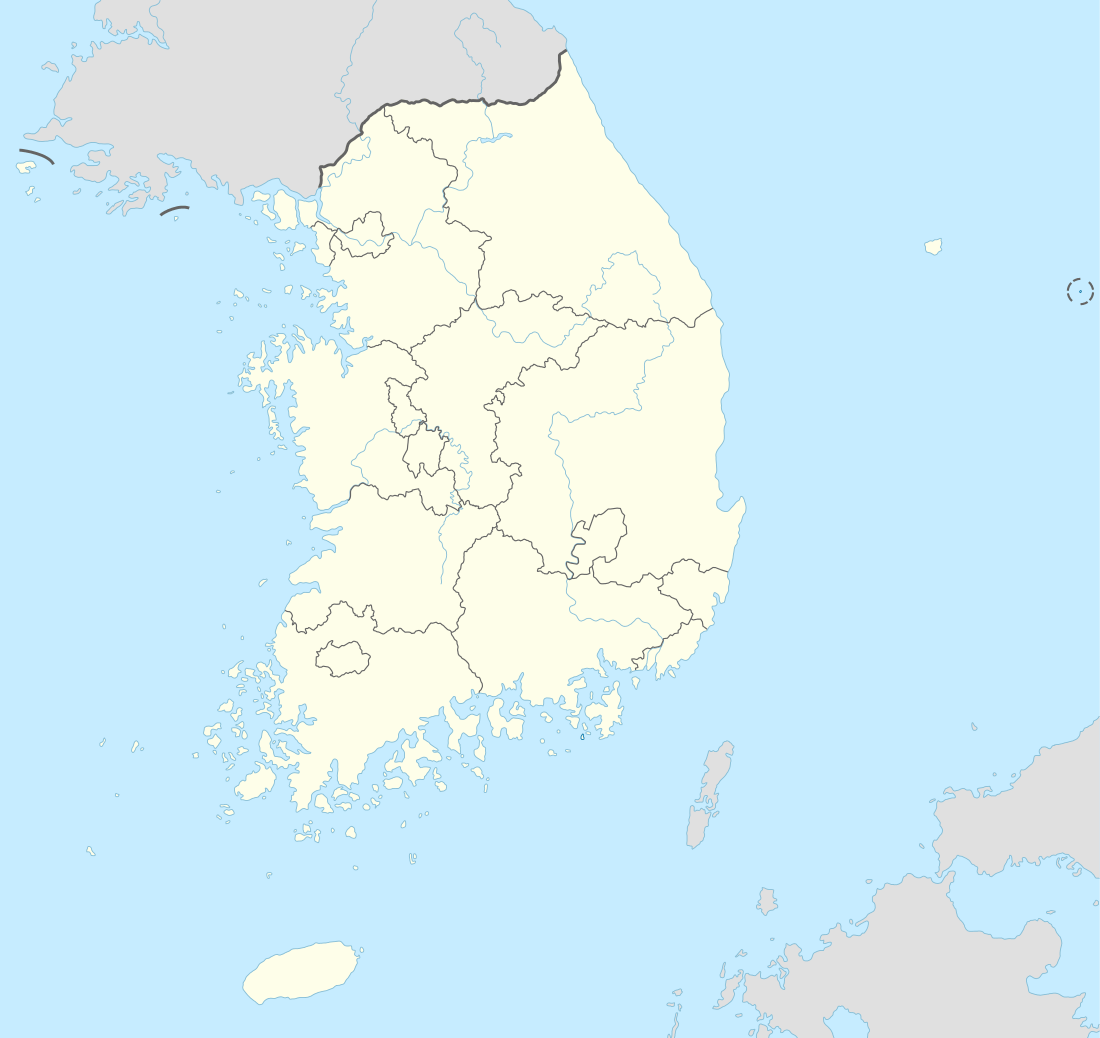2002 FIFA World Cup
| 2002 FIFA 월드컵 한국/일본 2002 FIFA Woldeu Keob Hanguk/Ilbon 2002 FIFAワールドカップ 韓国/日本 2002 FIFA Waarudo Kappu Kankoku/Nihon | |
|---|---|
 2002 FIFA World Cup official logo | |
| Tournament details | |
| Host countries |
South Korea Japan |
| Dates | 31 May – 30 June |
| Teams | 32 (from 5 confederations) |
| Venue(s) | 20 (in 20 host cities) |
| Final positions | |
| Champions |
|
| Runners-up |
|
| Third place |
|
| Fourth place |
|
| Tournament statistics | |
| Matches played | 64 |
| Goals scored | 161 (2.52 per match) |
| Attendance | 2,705,197 (42,269 per match) |
| Top scorer(s) |
|
| Best player |
|
| Best young player |
|
| Best goalkeeper |
|
| Fair play award |
|
The 2002 FIFA World Cup was the 17th FIFA World Cup, the quadrennial world championship for men's national football teams organized by FIFA. It was held from 31 May to 30 June 2002 at sites in South Korea and Japan, with its final match hosted by Japan at International Stadium in Yokohama.
A field of 32 teams qualified for this World Cup, which was the first to be held in Asia, the first to be held outside of the Americas or Europe, as well as the first to be jointly-hosted by more than one nation. China, Ecuador, Senegal and Slovenia made their World Cup debuts.
The tournament had several upsets and surprise results, which included the defending champions France being eliminated in the group stage after earning a single point and second favourites Argentina also being eliminated in the group stage. South Korea managed to reach the semi-finals, beating Spain, Italy and Portugal en route. However, the most potent team at the tournament, Brazil, prevailed, winning the final against Germany 2–0, making them the first and only country to have won the World Cup five times.[1] The victory qualified Brazil for the 2003 and subsequently 2005 FIFA Confederations Cups, its fourth and fifth Confederations Cup appearance in a row. In the third place play-off match against South Korea, Turkey won 3–2, taking third place in only their second ever FIFA World Cup.[2]
Host selection
South Korea and Japan were selected as hosts by FIFA on 31 May 1996. Initially, South Korea, Japan and Mexico presented three rival bids. FIFA officials brokered a united bid between the two Asian countries shortly before the decision was made, and they were chosen unanimously in preference to Mexico.[3] This was the first World Cup to be hosted by more than one country, the second being the 2026 World Cup, which will be hosted by the United States, Mexico and Canada. The general secretary of South Korea's bidding committee, Song Young-shik, stated that FIFA was interested in staging some matches in North Korea in order to aid Korean reunification, but it was ruled out.[4]
At the time the decision was made, Japan had never qualified for a World Cup finals (although the Japanese did subsequently qualify for the 1998 competition). The only other countries to have been awarded a World Cup without previously having competed in a final tournament are Italy in 1934 and Qatar in 2022 (Uruguay hosted the first World Cup in 1930 so there was no prior tournament; they were defending Olympic champions from 1928).
The unusual choice of host proved an issue for football fans in Europe, used to watching international matches on or close to their time zone.[5] With games taking place in the European morning, some schools and businesses chose to open late on match days or set up communal watching events before the start of work.[6][7]
Qualification
199 teams attempted to qualify for the 2002 World Cup. The qualification process began with the preliminary draw held in Tokyo on 7 December 1999. Defending champions France and co-hosts South Korea and Japan qualified automatically and did not have to play any qualification matches. This was the final World Cup in which the defending champions qualified automatically.[8]
14 places were contested by UEFA teams (Europe), five by CAF teams (Africa), four by CONMEBOL teams (South America), four by AFC teams (Asia) and three by CONCACAF teams (North and Central America and the Caribbean). The remaining two places were decided by playoffs between AFC and UEFA and between CONMEBOL and OFC (Oceania). Four nations qualified for the finals for the first time: China, Ecuador, Senegal and Slovenia. As of 2018, this was the last time the Republic of Ireland, Turkey and China qualified for a FIFA World Cup finals, as well as the last time Australia and Switzerland failed to qualify.
Turkey qualified for the first time since 1954, Poland and Portugal both qualified for the first time since 1986 and Costa Rica and Uruguay qualified for the first time since 1990. Sweden, Russia and the Republic of Ireland also returned after missing the 1998 World Cup. 1998 semi-finalists the Netherlands, three times 1990s participants Romania and Colombia and Norway, Bulgaria and Morocco, which had participated in the previous 2 finals, failed to qualify, while South Korea set a record by appearing in a fifth successive finals tournament, the first nation from outside Europe or the Americas to achieve this feat.
All seven previous World Cup-winning nations (Argentina, Brazil, England, France, Germany, Italy and Uruguay) qualified, the first time so many previous champions had been present at a finals tournament (all these nations had also appeared at the 1986 tournament, but France had not yet won the competition). The highest ranked team not to qualify was Colombia (ranked 4th), while the lowest ranked team that did qualify was China PR (ranked 50th).
List of qualified teams
The following 32 teams, shown with final pre-tournament rankings,[9] qualified for the final tournament:
|
|
|
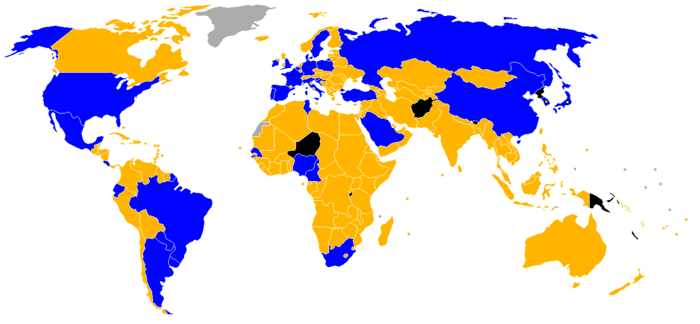 Countries qualified for the World Cup Country failed to qualify Countries that did not enter the World Cup Country not a FIFA member
|
Venues
South Korea and Japan each provided 10 venues, the vast majority of them newly built for the tournament. Groups A–D played all their matches in South Korea and Groups E–H played all their matches in Japan.[10] The stadiums in Daegu, Suwon, Yokohama and Saitama all hosted 4 matches each, while the other 16 stadiums hosted 3 matches each. Notably, no matches were played in Tokyo, making it the first capital of a host country not to have a World Cup venue (although there were matches played in cities close to or part of the Tokyo metropolitan area).
- A cross denotes an indoor stadium.
| Daegu | Seoul | Busan | Incheon | Ulsan | |
|---|---|---|---|---|---|
| Daegu World Cup Stadium Capacity: 68,014[11] Group/Third place |
Seoul World Cup Stadium Capacity: 63,961[12] Group/Knock-out |
Busan Asiad Stadium Capacity: 55,982[13] Group |
Incheon Munhak Stadium Capacity: 52,179[14] Group |
Ulsan Munsu Football Stadium Capacity: 43,550[15] Group/Knock-out | |
 |
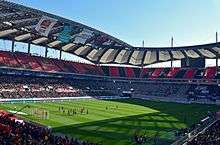 |
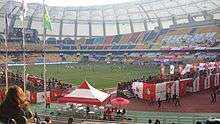 |
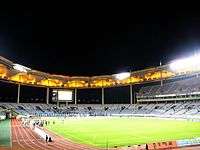 |
 | |
| Suwon | Gwangju | Jeonju | Seogwipo | Daejeon | |
| Suwon World Cup Stadium Capacity: 43,188[16] Group/Knock-out |
Gwangju World Cup Stadium Capacity: 42,880[17] Group/Knock-out |
Jeonju World Cup Stadium Capacity: 42,391[18] Group/Knock-out |
Jeju World Cup Stadium Capacity: 42,256[19] Group/Knock-out |
Daejeon World Cup Stadium Capacity: 40,407[20] Group/Knock-out | |
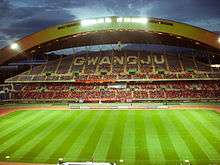 |
 |
 |
|||
|
South Korea |
Japan | ||||
| Yokohama | Saitama | Shizuoka | Osaka | Rifu | |
| International Stadium Yokohama Capacity: 72,327[21] Group/Final |
Saitama Stadium 2002 Capacity: 63,000[22] Group/Knock-out |
Shizuoka "Ecopa" Stadium Capacity: 50,600[23] Group/Knock-out |
Nagai Stadium Capacity: 50,000[24] Group/Knock-out |
Miyagi Stadium Capacity: 49,000[25] Group/Knock-out | |
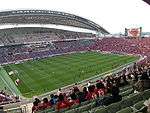 |
 |
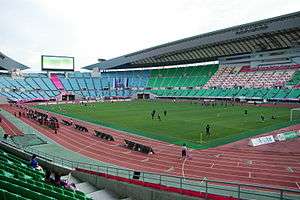 |
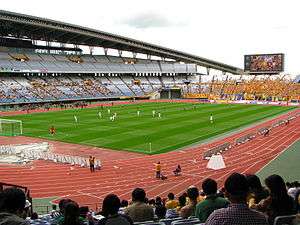 | ||
| Ōita | Niigata | Kashima | Kobe | Sapporo | |
| Ōita Stadium Capacity: 43,000[26] Group/Knock-out |
Niigata Stadium Capacity: 42,300[27] Group/Knock-out |
Kashima Soccer Stadium Capacity: 42,000[28] Group |
Kobe Wing Stadium Capacity: 42,000[29] Group/Knock-out |
Sapporo Dome Capacity: 42,000[30] Group | |
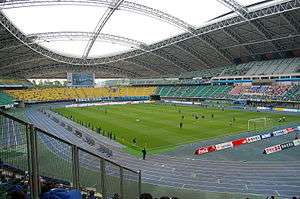 |
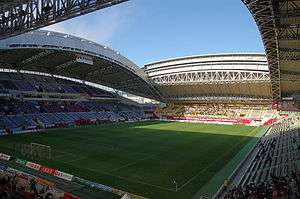 |
||||
Match officials
There was much controversy over the refereeing in the tournament. Questionable decisions in the match between Italy and South Korea resulted in 400,000 complaints, and featured in ESPN's 10 most fabled World Cup controversies.[31] The match between Spain and South Korea featured two controversially disallowed Spanish goals, which Iván Helguera referred to as "a robbery" and led to Spanish press brandishing the officials "thieves of dreams", though FIFA dismissed the incident as human error.[32]
Squads
This was the first World Cup that featured squads of 23 players, an increase from 22 previously. Of the 23 players, 3 must be goalkeepers.
Seeds
The eight seeded teams for the 2002 tournament were announced on 28 November 2001. The seeds comprised Pot A in the draw. Pot B contained the remaining 11 European sides; Pot C contained five unseeded qualifiers from CONMEBOL and AFC. Pot D contained unseeded sides from the CONCACAF region and Africa.[33] This was the last FIFA World Cup with the defending champion in Group A. Since 2006, the Host nation has been in Group A.
| Pot A | Pot B | Pot C | Pot D |
|---|---|---|---|
Before the draw, it was arranged that the last three teams in Pot B would be drawn into four groups which did not already contain two European teams and one would be left without a second European team. This was ultimately Group C. No group could contain more than two European teams, no unseeded South American team could be drawn with Brazil or Argentina and no unseeded Asian team could be drawn with South Korea or Japan.
France, as holders were automatically placed in Group A, South Korea were placed in Group D and Japan were placed in Group H. One of the two South American seeds (Brazil and Argentina) had to play in a group played in South Korea and the other had to play in a group played in Japan. In Pot C, China had to play in South Korea (either group A, B or C) which meant that the other Asian team in Pot C (Saudi Arabia) had to play in Japan (either group E, F or G). In Pot D, two or three African teams and one or two CONCACAF teams had to play in either South Korea or Japan.
On 1 December 2001, the draw was held and the group assignments and order of fixtures were determined. Group F was considered the group of death, as it brought together Argentina, England, Nigeria and Sweden.
Results
Group stage
All times are Korea Standard Time and Japan Standard Time (UTC+9)
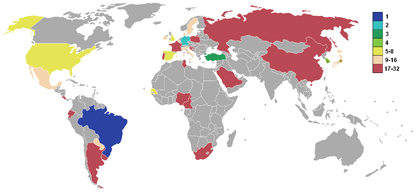
Champion Runner-up |
Third place Fourth place |
Quarter-finals Round of 16 |
Group stage |
Groups A, B, C, D based in South Korea. Groups E, F, G, H based in Japan.
In the following tables:
- Pld = total games played
- W = total games won
- D = total games drawn (tied)
- L = total games lost
- GF = total goals scored (goals for)
- GA = total goals conceded (goals against)
- GD = goal difference (GF−GA)
- Pts = total points accumulated

The teams in the group play were ranked upon
- Points
- Greatest total goal difference in the three group matches
- Greatest number of goals scored in the three group matches
- Most points earned in matches against other teams in the tie
- Greatest goal difference in matches against other teams in the tie
- Greatest number of goals scored in matches against other teams in the tie
- Drawing of lots
In the original version of the rules for the final tournament, the ranking criteria were in a different order, with head-to-head results taking precedence over total goal difference. The rules were changed to the above in advance of the tournament, but older versions were still available on the FIFA and UEFA websites, causing some confusion among those trying to identify the correct criteria.[34]
Group A
Group A involved the defending champions France, along with Senegal, Uruguay and Denmark. The World Cup started with a 1–0 defeat of France, playing without the injured Zinedine Zidane, by tournament newcomers Senegal in the tournament's opening match held in Seoul, South Korea.[35] On the next day, two goals by Jon Dahl Tomasson gave the Danes a 2–1 victory over Uruguay in Ulsan.
In the second set of Group A matches, France were held to a 0–0 draw in Busan by Uruguay after star striker Thierry Henry was sent off, while in Daegu, Denmark and Senegal drew 1–1.[36]
A 2–0 defeat by Denmark in their last group game in Incheon sealed France's elimination from the World Cup.[37]
France went out of the Cup without even managing to score a goal and earned the unwanted record of the worst World Cup performance by World Cup holders (in 1934 Uruguay refused to defend the title).[38]
Senegal drew with Uruguay to clinch their place in the second round, despite Uruguay coming back from 3–0 down to draw 3–3, in their last group game in Suwon. The South Americans couldn't find the fourth goal that would have kept them in the Cup and thus were out of the tournament.[39] At the end, Denmark won Group A with 7 points, followed by Senegal with 5 points. Uruguay were eliminated with 2 points and holders France with 1 point.
| Pos | Team | Pld | W | D | L | GF | GA | GD | Pts | Qualification |
|---|---|---|---|---|---|---|---|---|---|---|
| 1 | 3 | 2 | 1 | 0 | 5 | 2 | +3 | 7 | Advance to knockout stage | |
| 2 | 3 | 1 | 2 | 0 | 5 | 4 | +1 | 5 | ||
| 3 | 3 | 0 | 2 | 1 | 4 | 5 | −1 | 2 | ||
| 4 | 3 | 0 | 1 | 2 | 0 | 3 | −3 | 1 |
| 31 May 2002 | |||
| France | 0–1 | Seoul World Cup Stadium, Seoul | |
| 1 June 2002 | |||
| Uruguay | 1–2 | Munsu Cup Stadium, Ulsan | |
| 6 June 2002 | |||
| Denmark | 1–1 | Daegu World Cup Stadium, Daegu | |
| France | 0–0 | Asiad Main Stadium, Busan | |
| 11 June 2002 | |||
| Denmark | 2–0 | Incheon Munhak Stadium, Incheon | |
| Senegal | 3–3 | Suwon World Cup Stadium, Suwon |
Group B
Spain in Group B became one of only two teams to pick up maximum points, seeing off both Slovenia and Paraguay (In Gwangju and Jeonju respectively) 3–1 before defeating South Africa 3–2 in Daejeon.[40]
Paraguay advanced over a late goal, winning 3–1 over newcomer Slovenia in Seogwipo to tie with South Africa on goal difference (they were already tied with four points, having drawn 2–2 in their opening game against each other in Busan). As a result, Paraguay advanced to the second round on the goals scored tiebreaker, scoring six goals compared to South Africa's five.[41]
| Pos | Team | Pld | W | D | L | GF | GA | GD | Pts | Qualification |
|---|---|---|---|---|---|---|---|---|---|---|
| 1 | 3 | 3 | 0 | 0 | 9 | 4 | +5 | 9 | Advance to knockout stage | |
| 2 | 3 | 1 | 1 | 1 | 6 | 6 | 0 | 4 | ||
| 3 | 3 | 1 | 1 | 1 | 5 | 5 | 0 | 4 | ||
| 4 | 3 | 0 | 0 | 3 | 2 | 7 | −5 | 0 |
| 2 June 2002 | |||
| Paraguay | 2–2 | Asiad Main Stadium, Busan | |
| Spain | 3–1 | Gwangju World Cup Stadium, Gwangju | |
| 7 June 2002 | |||
| Spain | 3–1 | Jeonju World Cup Stadium, Jeonju | |
| 8 June 2002 | |||
| South Africa | 1–0 | Daegu World Cup Stadium, Daegu | |
| 12 June 2002 | |||
| South Africa | 2–3 | Daejeon World Cup Stadium, Daejeon | |
| Slovenia | 1–3 | Jeju World Cup Stadium, Seogwipo |
Group C
Group C saw Brazil become the other team to win all three of their Group matches, defeating Turkey 2–1 in Ulsan, China 4–0 in Seogwipo and Costa Rica 5–2 in Suwon.[42][43] Turkey also advanced to the next round, defeating Costa Rica on goal difference after both teams were tied with 4 points each.[44] China, coached by Bora Milutinović (the fifth national team he coached in five consecutive World Cups), failed to get a point or even score a goal.[45]
| Pos | Team | Pld | W | D | L | GF | GA | GD | Pts | Qualification |
|---|---|---|---|---|---|---|---|---|---|---|
| 1 | 3 | 3 | 0 | 0 | 11 | 3 | +8 | 9 | Advance to knockout stage | |
| 2 | 3 | 1 | 1 | 1 | 5 | 3 | +2 | 4 | ||
| 3 | 3 | 1 | 1 | 1 | 5 | 6 | −1 | 4 | ||
| 4 | 3 | 0 | 0 | 3 | 0 | 9 | −9 | 0 |
| 3 June 2002 | |||
| Brazil | 2–1 | Munsu Cup Stadium, Ulsan | |
| 4 June 2002 | |||
| China PR | 0–2 | Gwangju World Cup Stadium, Gwangju | |
| 8 June 2002 | |||
| Brazil | 4–0 | Jeju World Cup Stadium, Seogwipo | |
| 9 June 2002 | |||
| Costa Rica | 1–1 | Incheon Munhak Stadium, Incheon | |
| 13 June 2002 | |||
| Costa Rica | 2–5 | Suwon World Cup Stadium, Suwon | |
| Turkey | 3–0 | Seoul World Cup Stadium, Seoul |
Group D
Group D saw co-host South Korea, Poland, United States and Portugal square off against each other. South Korea and Poland started group play in Busan, where South Korea earned their first ever World Cup victory, defeating Poland 2–0. United States shocked group favorites Portugal the next day, defeating them 3–2 in Suwon. South Korea and United States then faced off in Daegu, where excellent goalkeeping by Brad Friedel and Lee Woon-jae resulted in a 1–1 draw, while a hat-trick by Pauleta gave the Portuguese a comfortable 4–0 win against Poland in Jeonju. In the final group games held in Incheon (Portugal-South Korea) and Daejeon (Poland-United States), South Korea eliminated Portugal thanks to a 70th-minute goal by Park Ji-sung, finishing the game 1–0, while Poland defeated United States 3–1. As a result, South Korea won their first ever group stage and advanced for the first time with seven points, while United States followed with four points. Portugal and Poland were eliminated with three points each in third and fourth places respectively.
| Pos | Team | Pld | W | D | L | GF | GA | GD | Pts | Qualification |
|---|---|---|---|---|---|---|---|---|---|---|
| 1 | 3 | 2 | 1 | 0 | 4 | 1 | +3 | 7 | Advance to knockout stage | |
| 2 | 3 | 1 | 1 | 1 | 5 | 6 | −1 | 4 | ||
| 3 | 3 | 1 | 0 | 2 | 6 | 4 | +2 | 3 | ||
| 4 | 3 | 1 | 0 | 2 | 3 | 7 | −4 | 3 |
| 4 June 2002 | |||
| South Korea | 2–0 | Asiad Main Stadium, Busan | |
| 5 June 2002 | |||
| United States | 3–2 | Suwon World Cup Stadium, Suwon | |
| 10 June 2002 | |||
| South Korea | 1–1 | Daegu World Cup Stadium, Daegu | |
| Portugal | 4–0 | Jeonju World Cup Stadium, Jeonju | |
| 14 June 2002 | |||
| Portugal | 0–1 | Incheon Munhak Stadium, Incheon | |
| Poland | 3–1 | Daejeon World Cup Stadium, Daejeon |
Group E
Group E saw Germany play against Saudi Arabia, the Republic of Ireland and Cameroon. Ireland and Cameroon started group play in Niigata in a 1–1 draw, while Germany thrashed Saudi Arabia 8–0 in Sapporo. In Ibaraki, Germany held a 1–0 lead over the Republic of Ireland thanks to a 19th-minute goal by Miroslav Klose, only to draw 1–1 due to a sensational 92nd-minute equaliser by Robbie Keane. Saudi Arabia bowed out of the tournament with a 1–0 defeat against Cameroon in Saitama, thanks to a second-half goal by Samuel Eto'o. In the final matches of Group E, Germany sent Cameroon out of the tournament, winning 0–2 in Shizuoka with goals by Marco Bode and Miroslav Klose, while Ireland defeated Saudi Arabia 3–0 in Yokohama with goals by Robbie Keane, Gary Breen and Damien Duff. Germany advanced with seven points and Ireland followed along with five points, while Cameroon was eliminated with four points. Saudi Arabia was eliminated without a single point or goal, having conceded 12 goals, finishing dead last in the tournament.
| Pos | Team | Pld | W | D | L | GF | GA | GD | Pts | Qualification |
|---|---|---|---|---|---|---|---|---|---|---|
| 1 | 3 | 2 | 1 | 0 | 11 | 1 | +10 | 7 | Advance to knockout stage | |
| 2 | 3 | 1 | 2 | 0 | 5 | 2 | +3 | 5 | ||
| 3 | 3 | 1 | 1 | 1 | 2 | 3 | −1 | 4 | ||
| 4 | 3 | 0 | 0 | 3 | 0 | 12 | −12 | 0 |
| 1 June 2002 | |||
| Republic of Ireland | 1–1 | Niigata Stadium, Niigata | |
| Germany | 8–0 | Sapporo Dome, Sapporo | |
| 5 June 2002 | |||
| Germany | 1–1 | Kashima Soccer Stadium, Ibaraki | |
| 6 June 2002 | |||
| Cameroon | 1–0 | Saitama Stadium 2002, Saitama | |
| 11 June 2002 | |||
| Cameroon | 0–2 | Shizuoka Stadium, Shizuoka | |
| Saudi Arabia | 0–3 | International Stadium Yokohama, Yokohama |
Group F
Group F was nicknamed the "group of death", featuring Argentina, Nigeria, England and Sweden. Argentina won their opening game in Ibaraki 1–0 against Nigeria thanks to a second-half goal by Gabriel Batistuta, while in Saitama England and Sweden drew 1–1 thanks to goals by Sol Campbell and Niclas Alexandersson. Sweden and Nigeria faced off in Kobe, where two goals by Henrik Larsson eliminated Nigeria 2–1. Meanwhile, in Sapporo, England won 1–0 over Argentina, thanks to a David Beckham penalty kick. In the final matches of Group F, England and Nigeria drew 0–0 in Osaka, while Sweden and Argentina drew 1–1 in Miyagi. Sweden and England advanced from Group F, first and second respectively with five points each, at the expense of Argentina's four points, while Nigeria finished last with one point.
| Pos | Team | Pld | W | D | L | GF | GA | GD | Pts | Qualification |
|---|---|---|---|---|---|---|---|---|---|---|
| 1 | 3 | 1 | 2 | 0 | 4 | 3 | +1 | 5 | Advance to knockout stage | |
| 2 | 3 | 1 | 2 | 0 | 2 | 1 | +1 | 5 | ||
| 3 | 3 | 1 | 1 | 1 | 2 | 2 | 0 | 4 | ||
| 4 | 3 | 0 | 1 | 2 | 1 | 3 | −2 | 1 |
| 2 June 2002 | |||
| Argentina | 1–0 | Kashima Soccer Stadium, Ibaraki | |
| England | 1–1 | Saitama Stadium 2002, Saitama | |
| 7 June 2002 | |||
| Sweden | 2–1 | Kobe Wing Stadium, Kobe | |
| Argentina | 0–1 | Sapporo Dome, Sapporo | |
| 12 June 2002 | |||
| Sweden | 1–1 | Miyagi Stadium, Miyagi | |
| Nigeria | 0–0 | Nagai Stadium, Osaka |
Group G
Group G saw Italy, Ecuador, Croatia and Mexico play against each other. Niigata saw the start of the group games, with Mexico winning 1–0 over Croatia, thanks to a penalty converted by Cuauhtémoc Blanco. Later that night in Sapporo, Italy defeated newcomers Ecuador 2–0 with ease, having both goals scored by Christian Vieri. Italy and Croatia faced off a few days later in Ibaraki, where Croatia pulled a 2–1 upset victory over Italy. The next day in Miyagi saw Mexico earn a vital victory over Ecuador 2–1. In the final matches of Group G, Mexico and Italy drew 1–1 in Ōita, while Ecuador achieved their first ever World Cup victory 1–0 over Croatia in Yokohama. Mexico won Group G with seven points, while Italy survived with four points. Croatia and Ecuador were eliminated with three points in third and fourth places respectively, with the former failing to repeat its surprise performance from 1998 despite their victory against Italy.
| Pos | Team | Pld | W | D | L | GF | GA | GD | Pts | Qualification |
|---|---|---|---|---|---|---|---|---|---|---|
| 1 | 3 | 2 | 1 | 0 | 4 | 2 | +2 | 7 | Advance to knockout stage | |
| 2 | 3 | 1 | 1 | 1 | 4 | 3 | +1 | 4 | ||
| 3 | 3 | 1 | 0 | 2 | 2 | 3 | −1 | 3 | ||
| 4 | 3 | 1 | 0 | 2 | 2 | 4 | −2 | 3 |
| 3 June 2002 | |||
| Croatia | 0–1 | Niigata Stadium, Niigata | |
| Italy | 2–0 | Sapporo Dome, Sapporo | |
| 8 June 2002 | |||
| Italy | 1–2 | Kashima Soccer Stadium, Ibaraki | |
| 9 June 2002 | |||
| Mexico | 2–1 | Miyagi Stadium, Miyagi | |
| 13 June 2002 | |||
| Mexico | 1–1 | Ōita Stadium, Ōita | |
| Ecuador | 1–0 | International Stadium Yokohama, Yokohama |
Group H
Group H saw co-hosts Japan square off against Belgium, Russia and Tunisia. Japan earned their first World Cup points in a spectacular 2–2 draw against Belgium in Saitama, while Russia defeated Tunisia in Kobe, 2–0. Japan would get their first ever World Cup victory a few days later in Yokohama, defeating Russia 1–0, thanks to a second-half goal by Junichi Inamoto, while Belgium and Tunisia drew 1–1 in Ōita. In the final matches of Group H, Japan defeated Tunisia with ease, winning 0–2 in Osaka, while Belgium survived against Russia in Shizuoka, winning 3–2. Japan won Group H with seven points, while Belgium advanced with five points. Russia was eliminated with three points and Tunisia was eliminated with one point.
| Pos | Team | Pld | W | D | L | GF | GA | GD | Pts | Qualification |
|---|---|---|---|---|---|---|---|---|---|---|
| 1 | 3 | 2 | 1 | 0 | 5 | 2 | +3 | 7 | Advance to knockout stage | |
| 2 | 3 | 1 | 2 | 0 | 6 | 5 | +1 | 5 | ||
| 3 | 3 | 1 | 0 | 2 | 4 | 4 | 0 | 3 | ||
| 4 | 3 | 0 | 1 | 2 | 1 | 5 | −4 | 1 |
| 4 June 2002 | |||
| Japan | 2–2 | Saitama Stadium 2002, Saitama | |
| 5 June 2002 | |||
| Russia | 2–0 | Kobe Wing Stadium, Kobe | |
| 9 June 2002 | |||
| Japan | 1–0 | International Stadium Yokohama, Yokohama | |
| 10 June 2002 | |||
| Tunisia | 1–1 | Ōita Stadium, Ōita | |
| 14 June 2002 | |||
| Tunisia | 0–2 | Nagai Stadium, Osaka | |
| Belgium | 3–2 | Shizuoka Stadium, Shizuoka |
Knockout stage
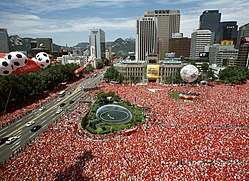
For the second round, quarter-finals and semi-finals, the qualifiers from Groups A, C, F and H played their games in Japan while the qualifiers from Groups B, D, E and G played their games in South Korea. Daegu, South Korea, hosted the third-place match while Yokohama, Japan, hosted the final.
Round of 16 and quarter-finals
In the second round, Germany beat Paraguay 1–0 with a late goal by Oliver Neuville in Seogwipo. England defeated Denmark in Niigata 3–0, with all goals occurring in the first half of the game. Sweden and Senegal faced off in Ōita and finished 1–1 in regular time and it took a golden goal from Henri Camara in extra time to settle the game for Senegal 2–1. Spain and Ireland played in Suwon, where Spain led most of the match 1–0 until a late penalty kick scored by Robbie Keane made the match go 1–1 sending it to extra time, where Spain outlasted Ireland 3–2 in a penalty shoot-out. The United States beat CONCACAF rivals Mexico 2–0 in Jeonju, thanks to the goals of Brian McBride and Landon Donovan. Brazil defeated Belgium 2–0 in Kobe, with an amazing volley by Rivaldo and a splendid counter-attack goal by Ronaldo. Turkey ended co-hosts Japan's run with a 1–0 win in Miyagi, thanks to a Ümit Davala goal in the 12th minute. The other co-hosts, South Korea, defeated Italy 2–1 in extra time in Daejeon with a goal by Ahn Jung-hwan in the 117th minute, after a match filled with many controversial referring decisions.[46] South Korea's win ensured that, for the very first time in the Cup's history, teams from each of Europe, North America, South America, Africa and Asia reached the quarter-finals of the same tournament.
In the quarter-finals, England and Brazil squared off in Shizuoka, where Ronaldinho scored a free-kick goal over England's David Seaman early in the second half as Brazil won 2–1. The United States lost to Germany 1–0 in Ulsan by a Michael Ballack goal in the 39th minute, but controversy surrounded the game when United States demanded the referee give a penalty for a goal-line handball by Torsten Frings in the 49th minute, but the referee did not award the penalty. South Korea got another win in Gwangju in a controversial manner, beating Spain 5–3 on penalties after a 0–0 draw in which the Spaniards twice thought they had scored while onside; however, the efforts were disallowed by the referee with controversial decisions.[47][48] The hosts became the first team in the Asian Football Confederation to reach the semi-finals of the World Cup, eclipsing the record of their North Korean counterparts who reached the quarter-finals in 1966. They also became the first World Cup semi-final team not from UEFA or CONMEBOL since the United States did it in 1930. Turkey defeated Senegal 1–0 in Osaka, with a golden goal scored by İlhan Mansız in the 93rd minute.
Semi-finals, third-place match and final
The semi-finals saw two 1–0 games; The first semi-final, held in Seoul saw a Michael Ballack goal good enough for Germany to defeat South Korea. However, Ballack had already received a yellow card during the match before, which forced him to miss the final based on accumulated yellow cards.[49] The next day in Saitama saw Ronaldo score a goal early in the second half, scoring his sixth of the competition for Brazil, who beat Turkey in a replay of their Group C encounter.[50][51]
In the third-place match in Daegu, Turkey beat the South Koreans 3–2, their first goal coming from Hakan Şükür straight from the opening kick-off (even though South Korea kicked off) in 10.8 seconds, the fastest ever goal in World Cup history.
In the final match held in Yokohama, Japan, two goals from Ronaldo secured the World Cup for Brazil as they claimed victory over Germany. Ronaldo scored twice in the second half and, after the game, won the Golden Shoe award for the tournament's leading scorer with eight goals. This was the fifth time Brazil had won the World Cup, cementing their status as the most successful national team in the history of the competition. Brazil became the only team since Argentina in 1986 to win the trophy without needing to win a penalty shoot-out at some stage during the knockout phase and the total number of penalty shoot-outs (2) was the lowest since the four-round knockout format was introduced in 1986. Brazil also became the first team to win every match at a World Cup Finals since 1970 and set a new record for highest aggregate goal difference (+14) for a World Cup winner. Brazil's captain Cafu, who became the first player to appear in three successive World Cup finals, accepted the trophy on behalf of the team.
| Round of 16 | Quarter-finals | Semi-finals | Final | |||||||||||
| 15 June – | ||||||||||||||
| 1 | ||||||||||||||
| 21 June – | ||||||||||||||
| 0 | ||||||||||||||
| 1 | ||||||||||||||
| 17 June – | ||||||||||||||
| 0 | ||||||||||||||
| 0 | ||||||||||||||
| 25 June – | ||||||||||||||
| 2 | ||||||||||||||
| 1 | ||||||||||||||
| 16 June – | ||||||||||||||
| 0 | ||||||||||||||
| 1 (3) | ||||||||||||||
| 22 June – | ||||||||||||||
| 1 (2) | ||||||||||||||
| 0 (3) | ||||||||||||||
| 18 June – | ||||||||||||||
| 0 (5) | ||||||||||||||
| 2 | ||||||||||||||
| 30 June – | ||||||||||||||
| 1 | ||||||||||||||
| 0 | ||||||||||||||
| 15 June – | ||||||||||||||
| 2 | ||||||||||||||
| 0 | ||||||||||||||
| 21 June – | ||||||||||||||
| 3 | ||||||||||||||
| 1 | ||||||||||||||
| 17 June – | ||||||||||||||
| 2 | ||||||||||||||
| 2 | ||||||||||||||
| 26 June – | ||||||||||||||
| 0 | ||||||||||||||
| 1 | ||||||||||||||
| 16 June – | ||||||||||||||
| 0 | Third place | |||||||||||||
| 1 | ||||||||||||||
| 22 June – | 29 June – | |||||||||||||
| 2 | ||||||||||||||
| 0 | 2 | |||||||||||||
| 18 June – | ||||||||||||||
| 1 | 3 | |||||||||||||
| 0 | ||||||||||||||
| 1 | ||||||||||||||
Round of 16
| Spain |
1–1 (a.e.t.) | |
|---|---|---|
| Morientes |
Report | Keane |
| Penalties | ||
| Hierro Baraja Juanfran Valerón Mendieta |
3–2 | |
| South Korea |
2–1 (a.e.t.) | |
|---|---|---|
| Seol Ki-hyeon Ahn Jung-hwan |
Report | Vieri |
Quarter-finals
| Spain |
0–0 (a.e.t.) | |
|---|---|---|
| Report | ||
| Penalties | ||
| Hierro Baraja Xavi Joaquín |
3–5 | |
Semi-finals
Third place play-off
| South Korea |
2–3 | |
|---|---|---|
| Lee Eul-yong Song Chong-gug |
Report | Hakan Ş. İlhan |
Final
Statistics
Goalscorers
Ronaldo won the Golden Shoe after scoring eight goals. In total, 161 goals were scored by 109 players, with three of them credited as own goals. Two of those own goals were in the same match, marking the first time in FIFA World Cup history that own goals had been scored by both teams in the same match.
| List of goalscorers by number of goals and by country |
|---|
Source: FIFA[52] |
Awards
| Golden Boot[53] | Golden Ball[53] | Yashin Award[53] | Best Young Player[53] | FIFA Fair Play Trophy[53] | Most Entertaining Team[53] |
|---|---|---|---|---|---|
1Oliver Kahn is the only goalkeeper to have won the Golden Ball in FIFA World Cup history.[54]
All-star team
| Goalkeepers | Defenders | Midfielders | Forwards |
|---|---|---|---|
|
|
|
||
| Source: USA Today, 29 June 2002 | |||
Final standings
After the tournament, FIFA published a ranking of all teams that competed in the 2002 World Cup finals based on progress in the competition, overall results and quality of the opposition.[55]
| R | Team | G | P | W | D | L | GF | GA | GD | Pts. |
|---|---|---|---|---|---|---|---|---|---|---|
| 1 | C | 7 | 7 | 0 | 0 | 18 | 4 | +14 | 21 | |
| 2 | E | 7 | 5 | 1 | 1 | 14 | 3 | +11 | 16 | |
| 3 | C | 7 | 4 | 1 | 2 | 10 | 6 | +4 | 13 | |
| 4 | D | 7 | 3 | 2 | 2 | 8 | 6 | +2 | 11 | |
| Eliminated in the quarter-finals | ||||||||||
| 5 | B | 5 | 3 | 2 | 0 | 10 | 5 | +5 | 11 | |
| 6 | F | 5 | 2 | 2 | 1 | 6 | 3 | +3 | 8 | |
| 7 | A | 5 | 2 | 2 | 1 | 7 | 6 | +1 | 8 | |
| 8 | D | 5 | 2 | 1 | 2 | 7 | 7 | 0 | 7 | |
| Eliminated in the round of 16 | ||||||||||
| 9 | H | 4 | 2 | 1 | 1 | 5 | 3 | +2 | 7 | |
| 10 | A | 4 | 2 | 1 | 1 | 5 | 5 | 0 | 7 | |
| 11 | G | 4 | 2 | 1 | 1 | 4 | 4 | 0 | 7 | |
| 12 | E | 4 | 1 | 3 | 0 | 6 | 3 | +3 | 6 | |
| 13 | F | 4 | 1 | 2 | 1 | 5 | 5 | 0 | 5 | |
| 14 | H | 4 | 1 | 2 | 1 | 6 | 7 | −1 | 5 | |
| 15 | G | 4 | 1 | 1 | 2 | 5 | 5 | 0 | 4 | |
| 16 | B | 4 | 1 | 1 | 2 | 6 | 7 | −1 | 4 | |
| Eliminated in the group stage | ||||||||||
| 17 | B | 3 | 1 | 1 | 1 | 5 | 5 | 0 | 4 | |
| 18 | F | 3 | 1 | 1 | 1 | 2 | 2 | 0 | 4 | |
| 19 | C | 3 | 1 | 1 | 1 | 5 | 6 | −1 | 4 | |
| 20 | E | 3 | 1 | 1 | 1 | 2 | 3 | −1 | 4 | |
| 21 | D | 3 | 1 | 0 | 2 | 6 | 4 | +2 | 3 | |
| 22 | H | 3 | 1 | 0 | 2 | 4 | 4 | 0 | 3 | |
| 23 | G | 3 | 1 | 0 | 2 | 2 | 3 | −1 | 3 | |
| 24 | G | 3 | 1 | 0 | 2 | 2 | 4 | −2 | 3 | |
| 25 | D | 3 | 1 | 0 | 2 | 3 | 7 | −4 | 3 | |
| 26 | A | 3 | 0 | 2 | 1 | 4 | 5 | −1 | 2 | |
| 27 | F | 3 | 0 | 1 | 2 | 1 | 3 | −2 | 1 | |
| 28 | A | 3 | 0 | 1 | 2 | 0 | 3 | −3 | 1 | |
| 29 | H | 3 | 0 | 1 | 2 | 1 | 5 | −4 | 1 | |
| 30 | B | 3 | 0 | 0 | 3 | 2 | 7 | −5 | 0 | |
| 31 | C | 3 | 0 | 0 | 3 | 0 | 9 | −9 | 0 | |
| 32 | E | 3 | 0 | 0 | 3 | 0 | 12 | −12 | 0 | |
Sponsorship
The sponsors of the 2002 FIFA World Cup are divided into two categories: FIFA World Cup Sponsors and Japan and South Korea Supporters.[56][57]
| List of sponsors for the tournament | ||
|---|---|---|
| FIFA World Cup sponsors | Japan sponsors | South Korea sponsors |
Ticket sales problem
The original domestic ticket allocation had fully sold out and the organising committee completed sales of tickets returned from the international allocation by the end of April. However, it was obvious at the opening matches that there were a significant number of empty seats.[74] It was gradually revealed that the World Cup Ticketing Bureau (WCTB) still had unsold tickets in its possession. After FIFA agreed to sell this inventory, JAWOC undertook sales over telephone and WCTB handled the internet sales.[75] For the second round Japan vs. Turkey match in Miyagi in particular, although it was reported by both parties that all tickets had been sold, some 700 seats remained empty.
Controversies
The tournament was criticized for many poor and questionable refereeing decisions. South Korea in particular faced scrutiny and allegations of corruption due to the favorable decisions they received in their controversial victories over Italy in the Round of 16 and over Spain in the Quarterfinals.[76][46][48]
Cultural event
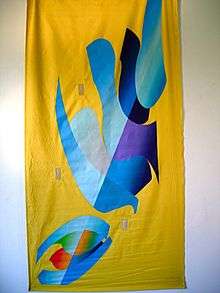
The official FIFA cultural event of the 2002 World Cup was a flag festival called Poetry of the Winds.[77] Held in Nanjicheon Park, an area of the World Cup Park close to the stadium,[78][79] Poetry of the Winds was exhibited from 29 May to 25 June in order to wish success upon the World Cup and promote a festive atmosphere. During the flag art festival, hand-painted flags from global artists were displayed as a greeting to international guests in a manner that was designed to promote harmony (2002 Flag Art Festival Executive Committee).[77]
See also
- Adidas Fevernova – match ball
- The Official Album of the 2002 FIFA World Cup
- The Doraemons movies: Goal! Goal! Goal!! (2002 FIFA World Cup movies)
References
- ↑ "Brazil crowned world champions". BBC Sport. 30 June 2002. Archived from the original on 27 March 2012. Retrieved 27 March 2012.
- ↑ "Turkey finish in style". BBC Sport. 29 June 2002. Archived from the original on 27 March 2012. Retrieved 27 March 2012.
- ↑ Jones, Grahame L. (1 June 1996). "A Political Football Lands in Japan and South Korea". The Los Angeles Times. Retrieved 22 July 2017.
- ↑ Jones, Grahame L. (5 June 1996). "North Korea Enters World Cup 2002 Mix". The Los Angeles Times. p. C4. Retrieved 1 January 2018 – via Newspapers.com.

- ↑ Goddard, Lexie. "Sports Marketing: Beer for Breakfast". Campaign. Retrieved 1 October 2015.
- ↑ Curtis, Polly. "School succumbs to football fever". The Guardian. Retrieved 1 October 2015.
- ↑ Quick, Chris. "World Cup 2002: a shot at goal". Accountancy Live. Archived from the original on 2 October 2015. Retrieved 1 October 2015.
- ↑ "Fifa forces World Cup winners to qualify". The Guardian. 30 November 2001. Retrieved 6 March 2018.
- ↑ "FIFA/Coca Cola World Ranking (15 May 2002)". FIFA.com. FIFA. 15 May 2002. Retrieved 12 September 2013.
- ↑ "2002 FIFA World Cup Korea/Japan – Report and Statistics" (PDF). FIFA.com. Fédération Internationale de Football Association. 2002. pp. 108–9. Retrieved 25 October 2013.
- ↑ "Daegu World Cup Stadium". FIFA (Fédération Internationale de Football Association). Archived from the original on 3 August 2002. Retrieved 19 July 2014.
- ↑ "Seoul World Cup Stadium". FIFA (Fédération Internationale de Football Association). Archived from the original on 10 August 2002. Retrieved 19 July 2014.
- ↑ "Busan Asiad Main Stadium". FIFA (Fédération Internationale de Football Association). Archived from the original on 3 August 2002. Retrieved 19 July 2014.
- ↑ "Incehon Munhak Stadium". FIFA (Fédération Internationale de Football Association). Archived from the original on 10 August 2002. Retrieved 19 July 2014.
- ↑ "Ulsan Munsu Football Stadium". FIFA (Fédération Internationale de Football Association). Archived from the original on 10 June 2002. Retrieved 19 July 2014.
- ↑ "Suwon World Cup Stadium". FIFA (Fédération Internationale de Football Association). Archived from the original on 10 August 2002. Retrieved 19 July 2014.
- ↑ "Gwangju World Cup Stadium". FIFA (Fédération Internationale de Football Association). Archived from the original on 10 August 2002. Retrieved 19 July 2014.
- ↑ "Jeonju World Cup Stadium". FIFA (Fédération Internationale de Football Association). Archived from the original on 10 August 2002. Retrieved 19 July 2014.
- ↑ "Jeju World Cup Stadium". FIFA (Fédération Internationale de Football Association). Archived from the original on 10 August 2002. Retrieved 19 July 2014.
- ↑ "Daejeon World Cup Stadium". FIFA (Fédération Internationale de Football Association). Archived from the original on 12 December 2002. Retrieved 19 July 2014.
- ↑ "International Stadium Yokohama". FIFA (Fédération Internationale de Football Association). Archived from the original on 10 August 2002. Retrieved 19 July 2014.
- ↑ "Saitama Stadium 2002". FIFA (Fédération Internationale de Football Association). Archived from the original on 4 June 2002. Retrieved 19 July 2014.
- ↑ "Shizuoka Stadium Ecopa". FIFA (Fédération Internationale de Football Association). Archived from the original on 10 August 2002. Retrieved 19 July 2014.
- ↑ "Nagai Stadium". FIFA (Fédération Internationale de Football Association). Archived from the original on 10 August 2002. Retrieved 19 July 2014.
- ↑ "Miyagi Stadium". FIFA (Fédération Internationale de Football Association). Archived from the original on 10 August 2002. Retrieved 19 July 2014.
- ↑ "Oita Stadium Big Eye". FIFA (Fédération Internationale de Football Association). Archived from the original on 10 June 2002. Retrieved 19 July 2014.
- ↑ "Niigata Stadium Big Swan". FIFA (Fédération Internationale de Football Association). Archived from the original on 10 August 2002. Retrieved 19 July 2014.
- ↑ "Ibaraki Kashima Stadium". FIFA (Fédération Internationale de Football Association). Archived from the original on 10 August 2002. Retrieved 19 July 2014.
- ↑ "Kobe Wing Stadium". FIFA (Fédération Internationale de Football Association). Archived from the original on 9 April 2002. Retrieved 19 July 2014.
- ↑ "Sapporo Dome". FIFA (Fédération Internationale de Football Association). Archived from the original on 2 August 2002. Retrieved 19 July 2014.
- ↑ "World Cup 101: Ten most controversial moments – ESPN Soccernet". Soccernet.espn.go.com. 11 July 2010. Retrieved 14 August 2013.
- ↑ Hayward, Paul (23 June 2002). "Korean miracle spoilt by refereeing farce". Telegraph.co.uk. Retrieved 14 August 2013.
- ↑ "How the draw works". BBC News. 28 November 2001. Retrieved 2 March 2012.
- ↑ "كأس العالم كوريا/اليابان 2002 FIFA". FIFA. June 2002. Archived from the original on 23 August 2012.
- ↑ "Senegal stun France". BBC Sport. 31 May 2002. Archived from the original on 27 March 2012. Retrieved 27 March 2012.
- ↑ "France face anxious wait". BBC Sport. 6 June 2002. Archived from the original on 29 March 2012. Retrieved 29 March 2012.
- ↑ "We got what we deserved, says dejected Vieira". Independent (UK). 12 June 2002. Archived from the original on 29 March 2012. Retrieved 29 March 2012.
- ↑ "Denmark 2, France 0". Sports Illustrated. 11 June 2002. Archived from the original on 29 March 2012. Retrieved 29 March 2012.
- ↑ "Senegal cling on to qualify". BBC Sport. 11 June 2002. Archived from the original on 27 March 2012. Retrieved 27 March 2012.
- ↑ "Spain reach last 16". BBC Sport. 7 June 2002. Archived from the original on 29 March 2012. Retrieved 29 March 2012.
- ↑ "Paraguay snatch vital win". BBC Sport. 12 June 2002. Archived from the original on 29 March 2012. Retrieved 29 March 2012.
- ↑ "Brazil dump out Costa Rica". BBC Sport. 13 June 2002. Archived from the original on 29 March 2012. Retrieved 29 March 2012.
- ↑ "Brazil samba missing vital beat". Irish Independent. 14 June 2002. Archived from the original on 29 March 2012. Retrieved 29 March 2012.
- ↑ "Turkey 3, China 0". Sports Illustrated. 13 June 2002. Archived from the original on 29 March 2012. Retrieved 29 March 2012.
- ↑ "Turkey reach last 16". Sports Illustrated. 13 June 2002. Archived from the original on 29 March 2012. Retrieved 29 March 2012.
- 1 2 "Blatter condemns officials". BBC Sport. 20 June 2002.
- ↑ "Top 10 worst refereeing decisions in World Cup history". Archived from the original on 3 July 2013. Retrieved 28 June 2013.
- 1 2 Hayward, Paul (23 June 2002). "Korean miracle spoilt by refereeing farce". Telegraph.co.uk.
- ↑ "Ballack lifts Germany past co-host, into seventh Cup final". Sports Illustrated. 25 June 2002. Archived from the original on 29 March 2012. Retrieved 29 March 2012.
- ↑ "Brazil stride into final". BBC Sport. 26 June 2002. Retrieved 29 March 2012.
- ↑ "Rejuvenation of Brazil awaiting one final fling". Irish Independent. 27 June 2002. Archived from the original on 29 March 2012. Retrieved 29 March 2012.
- ↑ "Statistics – Goalscorers". FIFA.com (Fédération Internationale de Football Association). Archived from the original on 3 August 2002. Retrieved 16 July 2014.
- 1 2 3 4 5 6 "Awards". FIFA.com. Fédération Internationale de Football Association. Retrieved 26 August 2014.
- ↑ "Kahn wins Golden Ball award". BBC Sport (British Broadcasting Corporation). 2 July 2002. Retrieved 27 March 2012.
- ↑ "All-time FIFA World Cup Ranking 1930–2010" (PDF). Fédération Internationale de Football Association. Retrieved 31 January 2013.
- ↑ "News Pepsi Ambush of the FIFA World Cup stopped in its track". FIFA.com. Retrieved 7 June 2002.
- ↑ "The Official FIFA World Cup™ Partners & Sponsors since 1982" (PDF). Resources.fifa.com. Retrieved 10 July 2018.
- ↑ "Archived copy". Archived from the original on 11 July 2018. Retrieved 10 July 2018.
- ↑ "2018 FIFA World Cup Russia™ - News - FIFA welcomes three new sponsors for 2002 FIFA World Cup™". FIFA.com. Retrieved 10 July 2018.
- ↑ Marican, Nawaz. "Avaya scores with World Cup 2002 deal - ZDNet". Zdnet.com. Retrieved 10 July 2018.
- ↑ "WORLD CUP 2002: Global marketing - Bud the Wiser. With Anheuser-Busch set to re-use its One World, One Game, One Beer theme, Adam Leyland looks at the global marketing strategy that underpins it". Campaignlive.co.uk. Retrieved 10 July 2018.
- ↑ "Coca-Cola extends FIFA partnership through 2006". FIFA.com. 30 January 1998. Retrieved 10 July 2018.
- ↑ "Fuji Xerox Inks Contract As 2002 FIFA World Cup Korea/JapanTM Official Partner". Fujixerox.co.jp. Retrieved 10 July 2018.
- ↑ "Fuji in £24m World Cup sponsor deal - Marketing Week". Marketingweek.com. Retrieved 10 July 2018.
- ↑ "WORLD CUP 2002: Global Marketing - Hyundai joins the squad. Hyundai is sponsoring the World Cup for the first time. Adam Leyland finds out why". Campaignlive.co.uk. Retrieved 10 July 2018.
- ↑ "McDonald's Scores for Children At the 2002 FIFA World Cup Korea/Japan". businesswireindia.com. Retrieved 10 July 2018.
- ↑ "McDonald's in line for major World Cup promotion upset". Campaignlive.co.uk. Retrieved 10 July 2018.
- ↑
- ↑ "Toshiba : Press Releases 7 Jun, 2001". Toshiba.co.jp. Retrieved 10 July 2018.
- ↑ "Toshiba Becomes Official Sponsor of FIFA World Cup. (Company Round-Up)". International Journal of Sports Marketing & Sponsorship. 3 (3). 1 September 2001. Retrieved 10 July 2018.
- ↑ "Yahoo! becomes the 15th Official Partner for the 2002 FIFA World Cup Korea/Japan™". FIFA.com. 11 September 2001. Retrieved 10 July 2018.
- ↑ "Yahoo! Becomes 15th 2002 FIFA World Cup Sponsor - News - Sportcal". Sportcal.com. Retrieved 10 July 2018.
- ↑ "Korea Telekom Becomes Official Partner of 2002 Fifa World Cup - News - Sportcal". Sportcal.com. Retrieved 10 July 2018.
- ↑ Demaria, Andrew (1 June 2002). "FIFA to probe empty seats". CNN.com. Cable News Network LP. Retrieved 10 August 2013.
- ↑ "World Cup 2002 Ticket Fiasco". Soccerphile.com. Retrieved 10 July 2018.
- ↑ Haisley, Billy. "Italian Paper Alleges FIFA Used Corrupt Refs To Fix 2002 World Cup Games". Deadspin. Retrieved 8 March 2017.
- 1 2 "Flag Art Festival Seoul". Le-musee-divisioniste.org. 29 May 2002. Archived from the original on 13 June 2013. Retrieved 14 August 2013.
- ↑ "SVAD News" (PDF). Archived from the original (PDF) on 28 March 2004. Retrieved 14 August 2013.
- ↑ "World Cup Park Seoul Neoul Park, Haneul, Nanji Hangang, Nanjicheon, Pyeonghwa". Exploring Korea. Archived from the original on 11 August 2013. Retrieved 14 August 2013.
External links
| Wikimedia Commons has media related to FIFA World Cup 2002. |
- 2002 FIFA World Cup Official Website (archived)
- 2002 FIFA World Cup Korea/Japan ™, FIFA.com
- FIFA Technical Report (Part 1) and (Part 2)
- RSSSF Archive of finals
- RSSSF Archive of qualifying rounds
